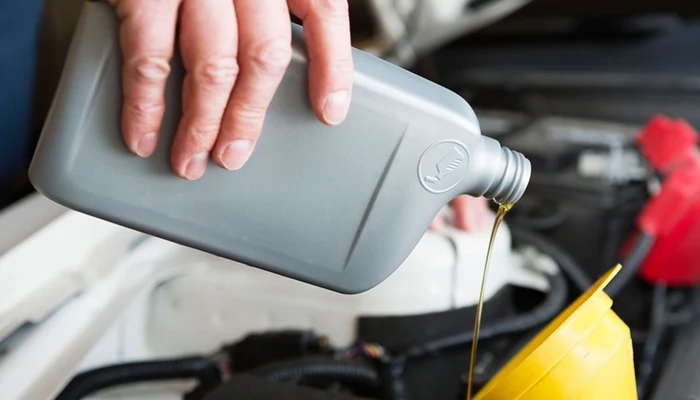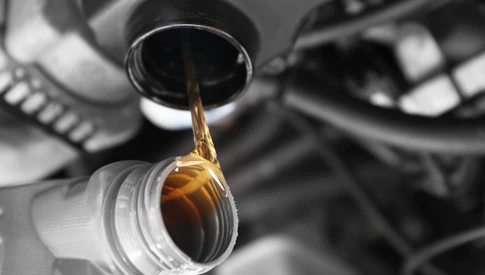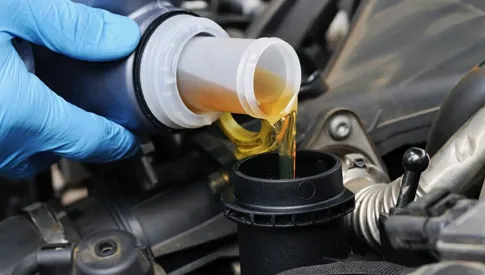Physical Address
304 North Cardinal St.
Dorchester Center, MA 02124
Physical Address
304 North Cardinal St.
Dorchester Center, MA 02124

Gear oil is an essential lubricant, particularly in transmissions, differentials, and gearboxes, for smooth operation and longevity. However, one prominent characteristic of gear oil is its distinctly unpleasant smell.
Sulfur-containing compounds, which are commonly found in gear oils, can contribute to the strong odor. Overheating of the gear oil can cause it to emit a foul smell.
Extreme pressure additives and limited slip additives, which are often used in gear oils, can also contribute to the odor. Contamination of the gear oil can also result in a bad smell.
Here, we will explain why this pungent odor permeates your car and what steps to take to eliminate it. From deciphering the underlying causes to exploring effective solutions, this article unravels the mystery behind the unpleasant scent of gear oil.

Regarding the unpleasant smell of gear oil in your vehicle, several factors are at play. Here are most of the reasons behind this pervasive odor:
Let’s go over each of these causes in more detail and see what steps you can take to reduce the stench of the gear oil.
To understand the unpleasant scent of gear oil, you need to be aware of the sulfur-containing compounds it contains. The high-pressure contact between the gear teeth necessitates the use of sulfur compounds.
Low sulfur gear oil formulations can reduce the odor associated with these compounds. These formulations are specifically designed to mitigate the smell while still providing necessary gear protection.
Additionally, employing odor-neutralizing products or activated carbon filters in the storage area can help control the scent of gear oil.
Gear oil overheats when it exceeds its recommended operating temperature range due to excessive load, inefficient cooling systems, or severe operating conditions. When gear oil overheats, it emits a foul smell that’s unmistakable.
To prevent this from happening, it’s crucial to maintain your vehicle’s cooling system in good condition. Regular checks and maintenance can ensure that the cooling system is functioning correctly, allowing it to dissipate heat effectively and keep gear oil temperatures within the safe range.
Hypoid gears need extreme-pressure additives, such as fluorinated compounds and molybdenum disulfide, to resist high-pressure contact. These additives give gear oil its distinctive odor.
Although it’s impossible to eliminate extreme pressure additives from gear oil, choosing gear oils with a lower concentration can help decrease the smell. It’s important to use gear oils specifically formulated for your vehicle’s needs to ensure the right balance between gear protection and odor control.
Limited slip differentials, commonly found in high-performance and off-road vehicles, require these additives to maintain proper operation.
The purpose of limited slip additives is to reduce friction and prevent excessive wear on the differential gears. They contain organic compounds that react with the metal surfaces, forming a protective film that reduces friction and heat.
However, these compounds have a strong odor that can be quite unpleasant.
While it may be tempting to use gear oil without limited slip additives to eliminate the smell, these additives are essential in certain applications. Consider using gear oil without limited slip additives if it’s suitable for your vehicle and won’t affect its overall performance.
The presence of foreign substances in gear oil or old, degraded oil can lead to a bad smell, whether it is synthetic or regular gear oil. Over time, the oil can break down and become contaminated, intensifying the smell.
To prevent contamination, it’s crucial to regularly change and maintain your gear oil according to the manufacturer’s recommendations. This ensures the oil remains clean and contaminant-free, reducing the smell and maintaining optimal performance.
When changing the gear oil, properly dispose of the old oil to prevent environmental contamination. Additionally, using high-quality gear oil with additives can help protect against contamination and extend the life of your gear oil.
When gear oil is spilled on hot engine components, the heat causes the oil to vaporize, resulting in a lingering and unpleasant smell inside your vehicle. It can happen when adding oil, changing the filter, or during a major repair.
To avoid these smells, use gloves and protective gear when working with hot engine components. Additionally, clean any spills as soon as they occur with an absorbent material like a cloth or shop towel to prevent them from spreading and causing more odors.

Gear oil storage areas in your car with inadequate ventilation may exacerbate the persistence of the odor. Due to its sulfur-based additives and extreme pressure modifiers, gear oil emits a strong and unpleasant smell.
Poor ventilation allows the odor-causing compounds in gear oil to accumulate, making the smell more pronounced.
To prevent this, ensure the storage area is well-ventilated, allowing constant fresh air flow. This can be achieved by opening a window or using an HVAC system if available. Lastly, use air filtering systems to ensure the area is clean and free from unpleasant odors.
The selection of gear oil is crucial because using cheap, incorrect, or expired gear oil can lead to potential gear damage and a stronger odor. Due to its strong smell, it is best to use only as much gear oil as necessary. Always use gear oil recommended by your vehicle’s manufacturer or specifically designed for your application.
By neglecting to perform regular maintenance on your vehicle’s gear oil, the foul odor can become even more pronounced. Gear oil can become contaminated with debris over time, causing it to emit a strong, unpleasant odor. The odor is often a result of the oil’s degradation and the presence of harmful substances.
When gear oil isn’t changed at the recommended intervals, its ability to lubricate and protect the gears diminishes, leading to increased friction and heat. This can result in premature wear and damage to the gears, as well as potential failure of the differential system.
To avoid these issues and reduce the foul smell, it’s crucial to adhere to your vehicle’s maintenance schedule and change the gear oil regularly. This will ensure that the oil remains clean, effective, and odor-free.
When working with gear oil, it’s important to wear protective clothing, such as gloves and coveralls, to prevent direct skin contact. It not only protects your skin from irritation but also prevents lingering odors on your car surfaces that can be difficult to remove.
Additionally, using a funnel or pump to transfer oil and avoiding spills or leaks will reduce the chances of encountering an unpleasant odor.
By following these guidelines, you can maintain a more pleasant and odor-free experience when working with gear oil while ensuring the longevity and efficiency of your vehicle.
You can mask gear oil smells with air fresheners in your car temporarily. Air fresheners work by releasing pleasant fragrances that help to mask or overpower unpleasant odors like gear oil.
They come in various forms, such as sprays, vent clips, or hanging air fresheners. When using air fresheners, it’s important to follow the instructions provided by the manufacturer to ensure proper usage and effectiveness.
Gear oil odor can have a significant impact on the resale value of your vehicle. Potential buyers may associate the smell with mechanical issues or neglect, which can deter them from purchasing your vehicle or lower their offer.
While it’s true that addressing any leaks or issues causing the odor is crucial, simply masking the smell with air fresheners isn’t a long-term solution. Buyers may still detect the underlying scent and become suspicious of hidden problems.
Therefore, it’s important to properly diagnose and fix the source of the gear oil odor to ensure the best resale value for your vehicle.
Breathing in gear oil fumes can be harmful to your health. While small amounts of exposure during normal handling are unlikely to cause harmful effects, breathing in large amounts of these fumes can be toxic.
Gear oil contains various chemicals, such as hydrocarbons and additives, which can pose health risks when inhaled in high concentrations. These fumes can irritate the respiratory system, leading to symptoms like coughing, shortness of breath, and chest tightness.
Now you know why your vehicle has a gear oil odor and why it’s important to diagnose and fix the source of the smell.
A few factors can be addressed to reduce the intensity of the odor, including the choice of gear oil, proper maintenance, and ventilation. And also assures that gear oil fulfills its primary function of protecting gears, minimizing wear and tear, and ensuring the efficiency of various mechanical parts.
Keep in mind that breathing in large quantities of gear oil fumes can be hazardous to your health, so you should take proper safety precautions when diagnosing and fixing the problem. Taking these steps will ensure that you remain safe while ensuring the best resale value for your vehicle.